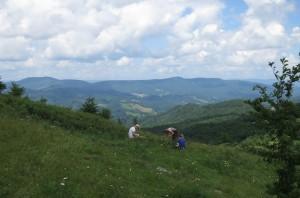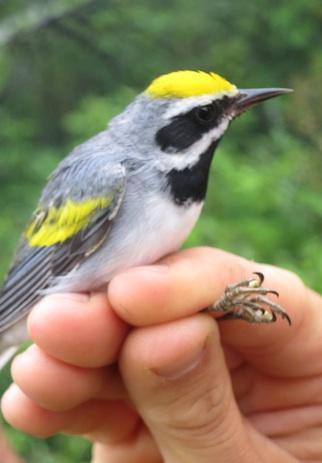Valerie Bruchon is one of our seasonal field biologists working to conserve and support golden-winged warblers and their habitats in Western North Carolina. Here, she has detailed her experience of a day in the field.
For most of us who are chasing down "golden-wings" in the wee hours of the morning, being up-and-at-'em before the daylight hours doesn't come naturally. Day after day, we wake up well before dawn, cram some breakfast in, reaffirm that coffee is our best friend, and drive out into the wilderness in the dim light of another morning. It's not the kind of job everyone is cut out for, but there is no doubt in my mind that it's worth the rewards! Any inconvenience or discomfort of this outdoor job is trumped by the satisfaction of getting to call mountaintops, cricketed hillsides, and rushing creeks my "office" – and above all, by the knowledge that my work with the warblers really matters.
Field Work is Rough, But Rewarding
While looking and listening for those little golden-wings, I run into other amazing things. A few mornings ago, heading toward potential nesting-habitat, I trekked through waist-high fields of milkweed wet with dew, and noticed a tangled little nest of translucent filaments, full of bright yellow spiders – just babies, the size of pinheads. Though not everyone's cup of tea, they’re just playing their part in intricate ecological webs.
I’ve waded through carpets of white wildflowers so thick underfoot that they look like snow; then as the sun rose behind them, an inch at a time, it colored their translucent petals golden. Some mornings, I get to watch rain clouds roll into a valley in the half-light of pre-dawn; afternoons, I may get to watch a thunderstorm rolling away over the green layered hills. On any day, I may stumble upon fidgety red efts, misty glades of blossoming apple trees, or skunks poking their way across a clearing.
Photo credit Valerie Bruchon
But sometimes, the discomforts of fieldwork are harder to ignore. My colleagues and I place bets to see how many minutes into the workday we can get until we're completely wet from the knees down! When the afternoon comes with its blazing sun, a hike up a steep slope, slippery and covered in briars, can make anyone question their sanity. The terrain is rocky, wet and treacherous, and attempting to find such elusive birds can be frustrating.
The Payoff of a Hard Day’s Work
“Ah! There she is, finally!" If the nuances of the female's behavior hint that there’s a nest nearby, it is utterly tantalizing, and it’s time to put my training into action. I pull back a bit, and observe which noises she makes, what exactly she's carrying in her mouth, whether she's flying from branch to branch or diving down low. Sometimes hours later, I’m finally rewarded with my payoff: a meticulously well-hidden nest the size of my fist, with tiny babies in it, pink and helpless. The real treasure: proof that this struggling species is indeed reproducing.
Photo Credit Valerie Bruchon.
To watch a male golden-wing staking his claim is a privilege: so small and delicate-looking, yet singing his heart out, chest fully puffed, fearlessly declaring his territory. I know that these birds are threatened, and that they need help. That's why, for me, it’s so rewarding to know that my colleagues and I are out there every day, reporting what we find, so that wildlife managers can be better informed of what golden-winged warblers need in order to thrive.
If you would like to donate to Audubon North Carolina and the conservation efforts for the Golden-winged Warbler click here.





